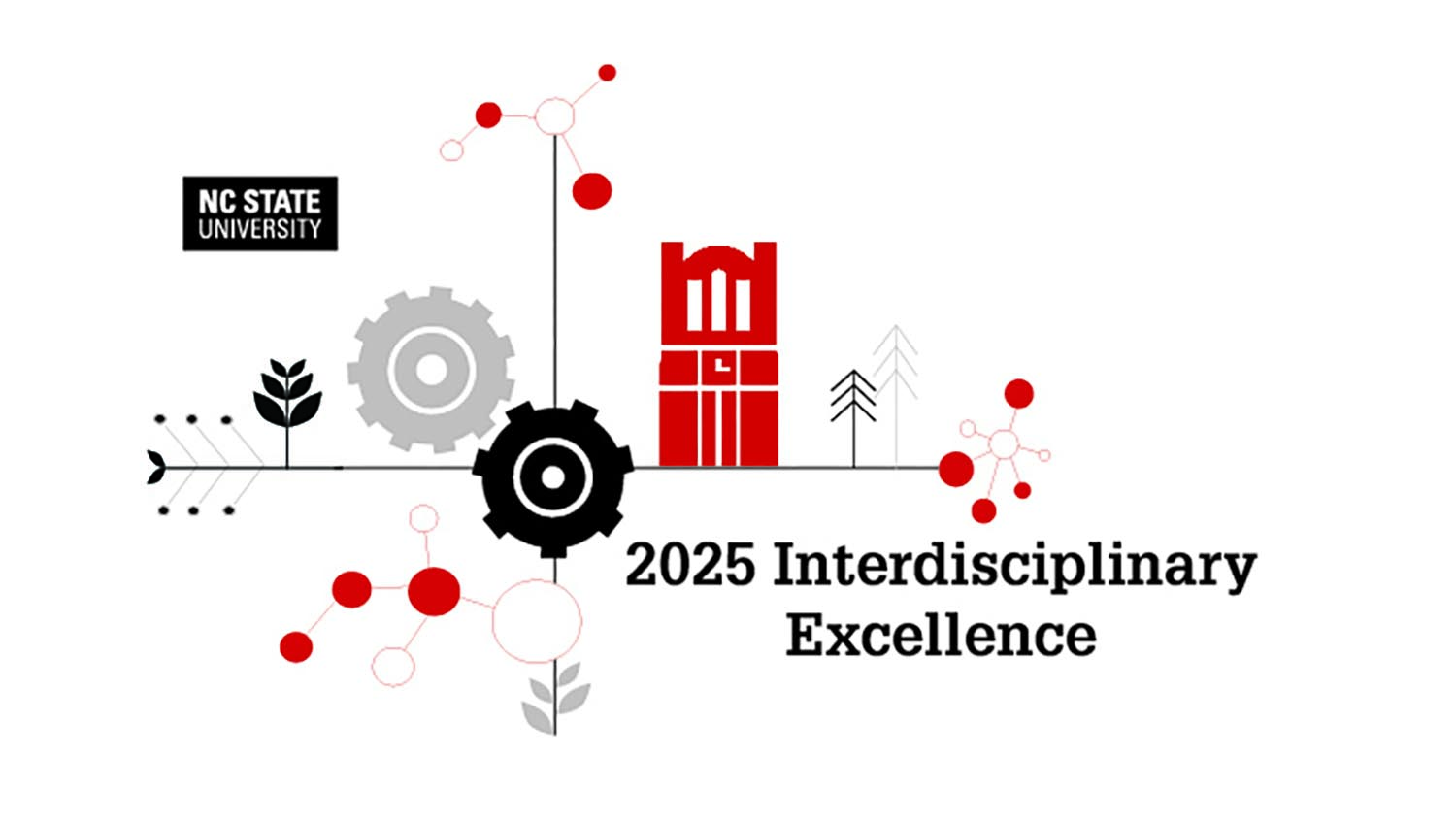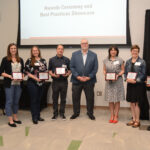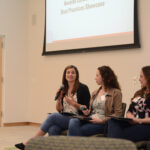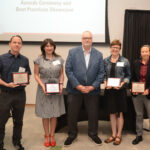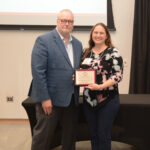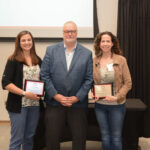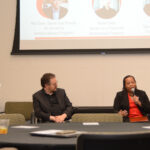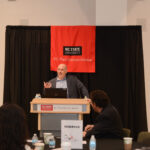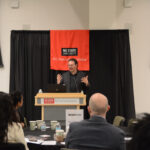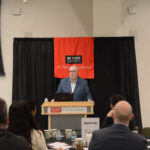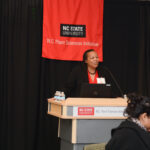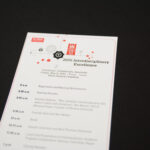The 2025 Interdisciplinary Excellence Event and Awards showcased NC State’s commitment to — and national leadership in — interdisciplinary collaboration and innovation.
The event and awards celebrated interdisciplinary research, teaching and collaboration success at NC State, made possible through the hard work and dedication of faculty, staff and students across the university. Attendees experienced dynamic conversations surrounding the state of interdisciplinarity at the university; heard from a keynote speaker, Executive Vice Chancellor and Provost Warwick Arden and other academic leaders; and celebrated the nominees and winners of the inaugural Warwick A. Arden Interdisciplinary Teaching Excellence Awards.
The awards were named in honor of the provost, recognizing his visionary leadership and steadfast support for interdisciplinary teaching at NC State. The designation reflects his lasting impact on advancing interdisciplinary innovation across our campus.
Intentionality in Interdisciplinarity
“When we speak of interdisciplinarity, we often focus on outcomes—breakthrough research, boundary-crossing curricula, or transformative community impact. While those outcomes are worth celebrating, it is essential to remember that the power of interdisciplinarity lies not just in what it produces but in what it represents,” said Arden. “It represents a mindset of approaching complexity with humility, collaboration, and curiosity. It reflects a commitment to looking beyond the edges of our expertise to learn from others. It also conveys the belief that today’s most pressing challenges—such as those involving technology, health, and society—cannot be solved by any one field alone.”
At NC State, interdisciplinarity has taken shape in powerful ways. It is witnessed in the Plant Sciences Building (where the event was held), a living symbol of disciplines converging to rethink agriculture, sustainability and food systems. University faculty also lead the way with efforts that span colleges and fields to create innovative courses and launch cross-cutting research centers and sought-after academic credentials. Students also participate, seeking experiences that challenge them to think integratively, to ask questions that don’t have easy answers, and to become leaders in a world that demands agility and interconnected thinking.
This is not accidental, it’s by design. Interdisciplinary innovation is woven into Wolfpack 2030: Empowering the Extraordinary, the structure of new initiatives like the Office of University Interdisciplinary Programs, and the spirit of NC State’s land-grant mission. That mission calls on the entire campus community to solve real problems, serve local communities, and prepare graduates for jobs and meaningful lives.
“To do that, we must continue to invest in the structures, people, and culture that allow interdisciplinary work to flourish,” said Arden. “We must reward risk-taking, create pathways for collaboration, and equip our students and faculty alike with the tools to lead at the intersections of knowledge. This is not a passing trend; it is the future of higher education.”
Spreading Knowledge and Insight
The keynote address, “Why authentic interdisciplinarity fails when it starts with disciplines,” was given by Ben Nelson, the CEO of Minerva Project and founder of Minerva University. Nelson started Minerva in 2011, with the goal of nurturing critical wisdom for the sake of the world through a systematic and evidence-based approach to learning. Over the past decade, he has built Minerva University into the most selective, innovative (ranked No. 1 according to WURI rankings), and effective university in the U.S., and has developed a business – Minerva Project – to share Minerva’s unique approach with other like-minded institutions.
“Our goal wasn’t to create a colossal university, but to build a prototype to demonstrate that a different approach to interdisciplinarity could work,” said Nelson. “What is NC State’s purpose and what should it be? What should be the foundation of achieving that purpose in what you nurture in your students? Authentic interdisciplinarity means that when a student is out in the real world, they are able to achieve extraordinary things.”
A fireside chat was held with Nelson, moderated by Senior Vice Provost for University Interdisciplinary Programs Rob Dunn, along with Senior Vice Provost for Faculty Excellence Kim Grainger and Senior Vice Provost for Instructional Programs Helen Chen. Audience members were able to ask questions about the profound impact interdisciplinarity can have on students and learning outcomes.
“At its heart, interdisciplinarity is a commitment to humility,” said Grainger. “It acknowledges that no single discipline holds all the answers, that insight often emerges from collaboration, and that the unknown is not a threat, but an invitation. It calls on us to listen across academic languages and build bridges between ways of knowing, thinking and doing.”
Award Nominees and Winners
The Warwick A. Arden Interdisciplinary Teaching Excellence Award was established to honor faculty who demonstrate exceptional creativity, innovation, and effectiveness in integrating interdisciplinary approaches into their teaching at NC State. For the inaugural award, 21 nominations were received from 16 academic departments representing 10 colleges and units. The nominees included:
- Agriculture Data Science Certificate – Department of Biological and Agricultural Engineering, Department of Horticultural Science
- B Corp Clinic Sustainability Practicum – Department of Management, Innovation and Entrepreneurship
- Biological Illustration – Department of Biological Sciences
- Cancer Drug Discovery and Development – Department of Chemistry, Department of Molecular Biomedical Sciences
- Climate Change and Sustainability – Department of Crop and Soil Sciences, Department of Forestry and Environmental Resources
- Data and the Human – Department of English
- Directed Evolution – Department of Biological Sciences
- Entrepreneurial Studies in the Arts – Department of Performing Arts and Technology
- Fashion Workroom Practices/Centuries of Designers: From Worth to the World – Department of Textile and Apparel, Technology and Management
- Greenhouse Management – Department of Horticultural Science
- Interdisciplinary Communication Program – Department of Clinical Sciences
- Introduction to Computing: Python – Department of Computer Science, Department of Textile Engineering, Chemistry and Science
- Listening to Climate Change – Department of Performing Arts and Technology
- The Many Faces of Water – Department of Biological Sciences
- Physiology Graduate Curriculum-Bohórquez Courses – Prestage Department of Poultry Science
- Responsible AI and Society – Department of English
- Scientific Inquiry at the Bench – Department of Biological Sciences
- Senior Design Center – Department of Computer Science
- Special Studies in Textile Engineering and Science – Department of Textile Engineering, Chemistry and Science
- The Legacy of Lynching – Department of Sociology and Anthropology
- Wicked Problems, Wolfpack Solutions – Department of Biological Sciences, DELTA
Award winners were:
- B Corp Clinic Sustainability Practicum (MBA 582), led by Jessica Thomas, an associate professor in the Department of Management, Innovation and Entrepreneurship.
NC State’s B Corp Clinic is an interdisciplinary, experiential learning initiative where student teams consult with local and global companies to help implement socially and environmentally responsible practices. Through real-world projects guided by B Lab’s B Impact Assessment, students collaborate to address sustainability challenges, develop stakeholder-centered mindsets, and gain the skills needed to lead purpose-driven organizations.
- Cancer Drug Discovery and Development (BIT 455/555), led by Audrey Fikes, an associate teaching professor in the Department of Chemistry, and Melissa Srougi, an assistant teaching professor in the Department of Molecular Biomedical Sciences.
Cancer Drug Discovery and Development offers students an intensive, interdisciplinary research experience focused on identifying novel therapies for triple-negative breast cancer. Through authentic lab work, computational analysis, critical reflection, and collaborative problem-solving, students contribute to addressing one of oncology’s most challenging issues while developing essential skills in scientific inquiry, ethics and communication.
- Physiology Graduate Curriculum — Bohórquez Courses, led by Elaine Bohórquez, an associate teaching professor in the Prestage Department of Poultry Science.
General Physiology I and II and Culinary Medicine offer practice-based interdisciplinary learning experiences that prepare future clinicians and researchers for real-world health challenges. These courses connect biomedical sciences, pathology, pharmacology, nutrition, and culinary arts to help students translate scientific knowledge into practical and equitable dietary guidance, advancing both health outcomes and professional readiness.
- Wicked Problems, Wolfpack Solutions — led by Jill Anderson, a senior instructional technologist in DELTA, G. Todd Buker, an instructional media producer in DELTA, Jason Flores, an associate teaching professor in the Department of Biological Sciences, Jane Lubischer, a teaching professor in the Department of Biological Sciences, and Melissa Ramirez, an associate teaching professor in the Department of Biological Sciences.
Wicked Problems, Wolfpack Solutions is a signature interdisciplinary course designed to explore complex global issues through engaging videos, podcasts, reflective activities and collaborative discussions. This innovative approach allows students to understand how wide-ranging perspectives contribute to addressing real-world wicked problems while launching their academic journey at NC State.
Following the recognition of awardees, a facilitated panel discussion was held with the awardees related to their interdisciplinary program/course, how these were intentionally created with interdisciplinary excellence in mind, and key takeaways that can inform other faculty around the university. Members of the audience were also provided with an opportunity to ask questions and engage with the awardees. The formal event program concluded with a presentation by members of the Interdisciplinary Academic Programs (IAP) Collaboration Advisory Committee that gave attendees insight into the formation, execution and success of IAPs at NC State and the university’s plan for interdisciplinary academic growth moving forward.
